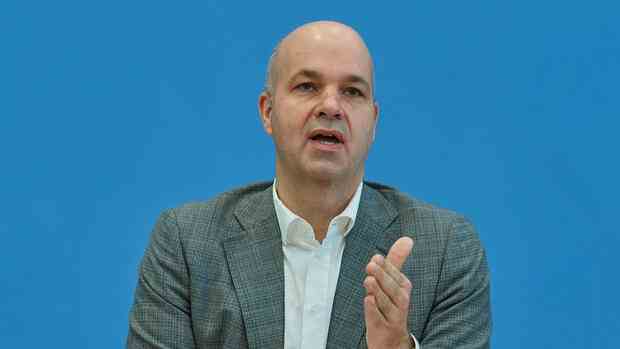Berlin The President of the German Institute for Economic Research (DIW), Marcel Fratzscher, accuses the industry of scaremongering because of the increased energy prices. The warning of de-industrialization is a bugbear, says Fratzscher of the Augsburger Allgemeine newspaper. “Ultimately, it is a bogeyman that is built up to get money out of politicians’ ribs.”
If, for example, BASF now produces chemical raw materials in the USA instead of in Germany, that is not a problem for the country. He is very optimistic that German industry will be able to cope well with the energy cost shock.
In this context, Fratzscher also criticizes the electricity and gas price brakes, which will take effect in the new year. “I think the two price brakes are colossal mistakes.”
From his point of view, the state could have helped the companies more cheaply and more precisely by applying for energy subsidies via the tax consultants in the same way as for the Corona aid.
He also accuses some companies of using high inflation to boost profits. “Many companies jump on the train and want to fill their pockets again.” It’s not about small and medium-sized companies, but above all about large corporations with strong pricing power. It is not a possible wage-price spiral that is responsible for the persistently high inflation, but the pricing policies of those companies. Fratzscher speaks of a “profit-price spiral”.
The Federal Minister of Economics does not expect that there will be a shortage of gas in the coming winter.
(Photo: dpa)
Economics Minister Robert Habeck is meanwhile preparing citizens for high gas prices until the end of 2023. “When will prices go down? I hope that it will be better towards the end of 2023, even if not at the level of 2021,” said the Green politician of the German Press Agency. “We will have to endure higher prices throughout the year.”
After that, the infrastructure will probably be developed to such an extent that sufficient replacement for the missing Russian gas will flow to Germany and the prices will regulate themselves again.
Gas price falls, but is well above historical average
Most recently, the gas price on Europe’s wholesale markets had already fallen. However, this has not yet had any direct impact on consumers’ gas bills, as many suppliers have stocked up on long-term contracts. Nevertheless, Habeck sees a positive development.
Gas is offered on the spot market that you buy today and buy tomorrow. Until mid-2021, the spot market price was usually in the range of 10 to 30 euros. In comparison, the price has more than tripled, the Economics Minister admitted. “But if you look at it from the summer of 2022 and remember the high prices of over 300 euros at times in August, things look different.”
>> Read also: This is how the energy market will continue in 2023
One answer to the high prices is the gas price brake, which artificially lowers a certain contingent of gas for consumers to a price of 12 cents per kilowatt hour by spring 2024. Above all, however, the infrastructure must be further expanded, stressed Habeck. “The prices are so high because half of the gas that Germany consumes was cut off by Putin’s supply freeze, and we had no supply infrastructure apart from the pipelines.”
Floating terminals for liquid gas should help. “If we manage to continue to expand at the pace now presented, then we will reconnect Germany to the world market,” affirmed Habeck. “And then we will also get the world market prices, which are well below what we have now.”
The first LNG shiploads have now reached the German coast.
(Photo: dpa)
With regard to the security of supply, the Green politician said he was glad that the temperatures had risen again after the icy weeks before Christmas. “Of course I feel like most people in the country: I think winter is nice when it’s cold,” he emphasized. “But I want to admit that I’m quite happy this year if it doesn’t get so bitterly cold in winter.”
During the cold spell in mid-December, the level in the gas storage tanks fell by more than one percentage point per day. Recently, however, it even rose again – probably because of the mild weather for December. According to data from the European gas storage association GIE, the storage facilities were more than 88 percent full on Christmas Day.
Habeck does not expect a lack of gas in the coming winter
Habeck therefore sees the supply for the current winter as secured. If the reservoirs are still 40 percent full at the beginning of February, then things are looking good for the winter of 2023/24, he said. “If the conditions stay as they are, we will not have a gas shortage. By that I don’t mean the weather situation, but the willingness of citizens and industry to save, the high storage level and the supply from non-Russian countries.”
The Federal Government and the Federal Network Agency repeatedly appeal to consumers and the economy to use gas sparingly so that fuel does not have to be rationed. Habeck has the impression that the citizens are doing well. “The fact that we are in this position is because the Germans saved gas in the fall,” he emphasized.
“People know that they are going easy on their wallets, but also upholding the country’s resilience.” Such solidarity is not a matter of course. “People do without comfort and luxury in the office and at home. In the consumer society in which we live, this is something completely unusual. I can only say thank you,” stressed Habeck.
More: Interview with environmental economist Ottmar Edenhofer – “We should resolutely oppose deindustrialization”
